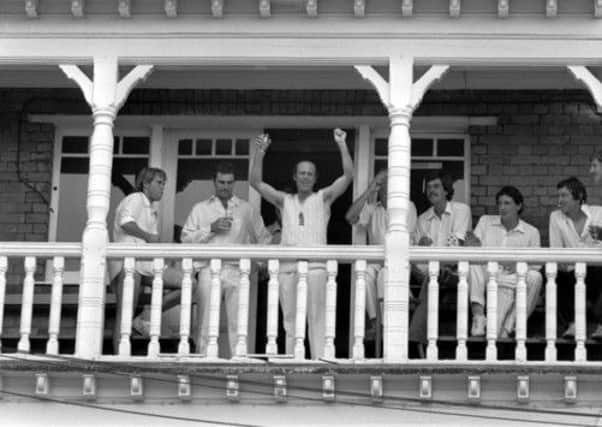Sporting Bygones: When Boycott overcame the horror of running out Trent Bridge hero Randall to record his finest innings on return from exile


“My 98th hundred,” replied the former Yorkshire and England opening batsman, referring to his 107 against Australia at Trent Bridge in 1977.
It was not the highest innings of Boycott’s career – that was 261 not out for MCC against a President’s XI at Barbados in 1974.
Advertisement
Hide AdAdvertisement
Hide AdIt might not even have been the most aesthetically pleasing.
But with regard to all considerations – the quality of bowling, the pressure of an Ashes Test, and, specifically, the circumstances surrounding the game from Boycott’s point of view, it was the innings that gave him the greatest pleasure.
The context of Boycott’s performance was this: he had not played Test cricket for three years after opting out due to his dissatisfaction with Mike Denness’s captaincy, along with sundry factors.
He had missed 30 Tests in pretty much his prime.
Now, at the Nottingham venue where he made his Test debut against Australia in 1964, he returned to be feted by some and frowned on by others, those who were actively willing him to fail.
Advertisement
Hide AdAdvertisement
Hide Ad“I was getting on – I was nearly 37 – and had been pilloried for not playing so was under intense pressure,” he recalled. “If I’d failed, people would have said, ‘What’s this all about? He’s rubbish. He’s past it’.
“The Aussies gave me a working over but I managed to get a hundred after running out Derek Randall on his home ground.
“That, of course, brought extra pressure.”
Boycott, who quips from 36 years’ distance that Randall “didn’t run fast enough”, was distraught at the time of the Nottingham man’s dismissal.
Boycott pushed a ball from Jeff Thomson back down the pitch towards Randall – and the bowler, moving panther-like three paces to his right, swooped on it, initially fumbled and yet still had time to lob it gently to wicketkeeper Rod Marsh, who whipped off the bails with Randall stranded.
Advertisement
Hide AdAdvertisement
Hide AdAs Randall departed to a stunned reception, Boycott stood motionless with his bat on the ground and his head in his hands, the cares of the world weighed down on his shoulders.
After that, he was even more determined to make a big score, and all was forgiven when he went to a hundred.
Boycott was helped along by wicketkeeper Alan Knott, with whom he shared a sixth-wicket stand of 215.
Knott top-scored with 135 as England made 364 in reply to Australia’s 243, Ian Botham taking 5-74 on Test debut.
Advertisement
Hide AdAdvertisement
Hide AdAfter Australia made 309 in their second innings, England wanted 189 to go 2-0 up in the third Test of the series.
They got them comfortably, Boycott (80no) and captain Mike Brearley (81) doing the bulk of the work with an opening partnership of 154.
Fittingly, Randall hit the winning run and, in a nice touch, walked off the field arm-in-arm with Boycott, who performed the singular feat of batting on all five days of the match as he thwarted Australia for over 12 hours.
Boycott was one not out at the close of the opening day, 88 not out at stumps on day two, completed his century on day three, was 12 not out by the close of day four and was there at the end on the final day.
Advertisement
Hide AdAdvertisement
Hide AdFor the Yorkshireman, the game represented a personal triumph – 187 runs in total and an England victory by seven wickets.
Boycott’s 99th century followed in his next innings, for Yorkshire against Warwickshire at Edgbaston.
He struck 104 in a match also memorable for the fact pace bowler Chris Old hammered a hundred in 37 minutes.
Every cricket lover knows what happened next.
Boycott’s next innings was 191 against Australia in the fourth Test at Headingley – his 100th first-class century.
Advertisement
Hide AdAdvertisement
Hide AdOne might have thought that would be Boycott’s most cherished performance, or perhaps his 146 against Surrey at Lord’s in the 1965 Gillette Cup final, when he famously hit out in a game Yorkshire won by 175 runs.
Both, of course, he remembers with fondness but it is that Trent Bridge Ashes century that tops his list.
In his 1987 autobiography, Boycott crystallised perfectly what the Trent Bridge innings had meant to him.
“I have played in some strange, stressful situations in my time, against intimidatingly fast bowling and with the clock ticking against my team,” he wrote. “I don’t think there are many permutations I have not encountered in cricket.
Advertisement
Hide AdAdvertisement
Hide Ad“But that innings at Trent Bridge was the finest I have ever played.
“Test cricket is hard enough without the extra tensions imposed by circumstances that day – the knowledge that many wanted me to fail, the realisation that more wanted me to succeed, the Randall run-out, all wrapped in a suffocating blanket of publicity.
“It was my hardest innings, physically, mentally and emotionally, and I did not give it away.
“I’m proud of that.”